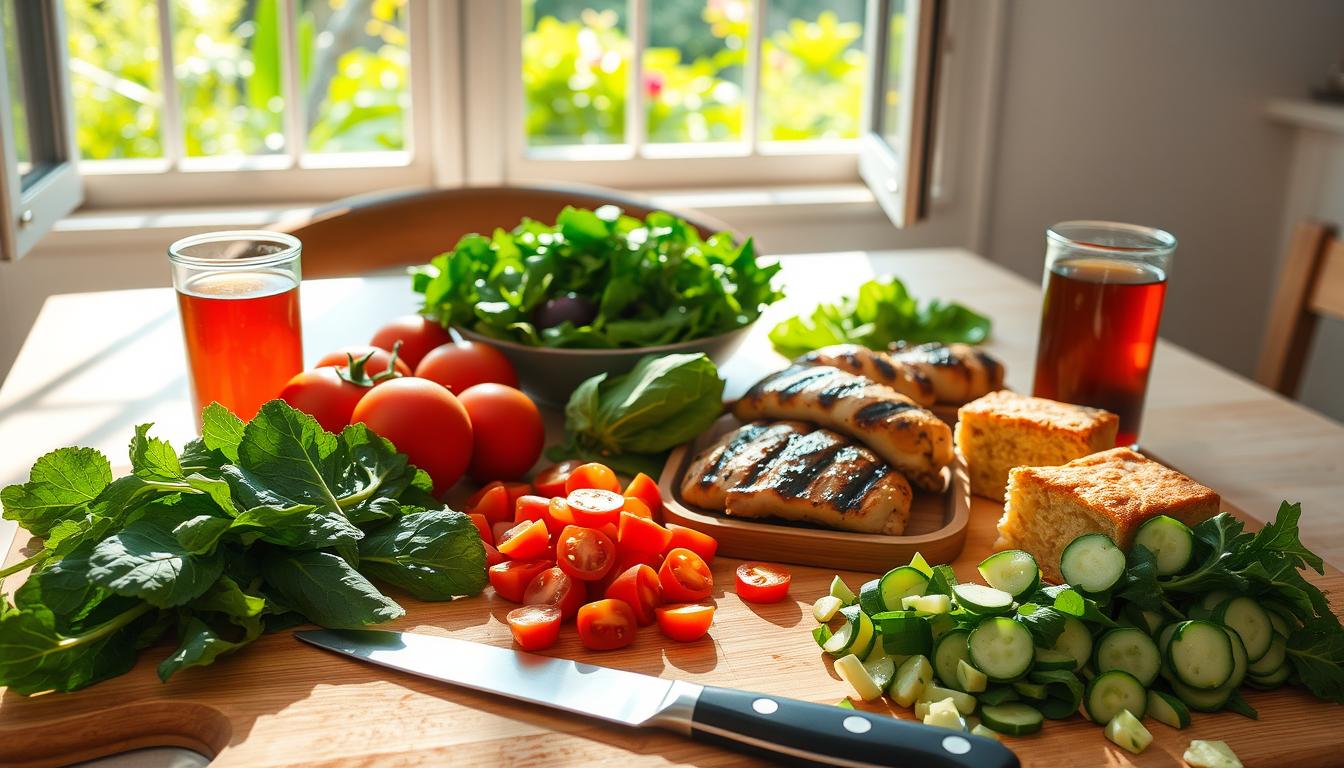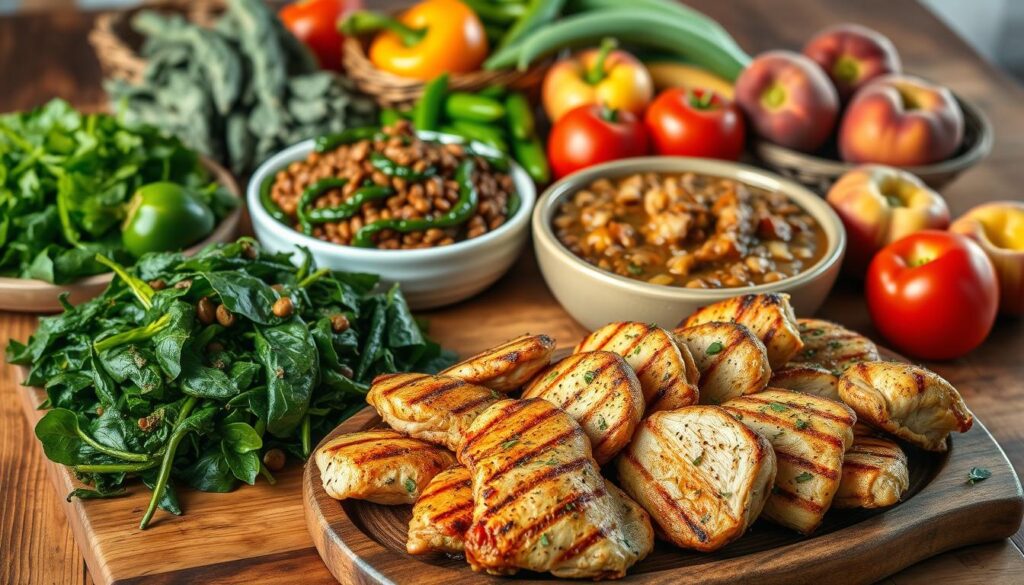Southern cuisine is famous for its bold flavors and hearty dishes. But many assume these traditional meals can’t align with healthier lifestyles. What if you could savor classics like fried chicken or biscuits without compromising your wellness journey?
While Southern cooking often relies on saturated fats, sodium, and added sugars, small swaps make a big difference. Experts like Dr. Kalpana Puri emphasize using lean proteins, whole grains, and fresh vegetables. Grilling instead of frying, for example, cuts unnecessary calories while keeping flavors vibrant.
Portion control and mindful eating are equally important. A balanced approach to body composition starts with understanding how to enjoy favorite foods in moderation. Pairing smarter cooking methods with hydration and nutrient-rich sides creates meals that satisfy both taste buds and health needs.
Key Takeaways
- Traditional Southern recipes can be modified to reduce saturated fats and sugars.
- Grilled or baked alternatives often retain flavor while improving nutrition.
- Portion sizes play a critical role in maintaining calorie balance.
- Hydration and vegetable-focused sides enhance meal satisfaction.
- Strategies from nutrition experts help preserve cultural food traditions.
Discovering the Southern Diet Landscape
Our culinary heritage thrives on comfort, but some ingredients carry hidden costs. Classic recipes often use lard or butter to achieve rich textures—think flaky biscuits or crispy fried dishes. These staples pack saturated fats that can raise cholesterol over time, impacting heart health.
Nutritional Challenges in Tradition
Processed meats like ham hocks and cured bacon add depth to stews and greens. However, they’re loaded with sodium—a single serving might exceed half the daily limit. “High salt intake doesn’t just affect blood pressure,” notes a CDC report. “It strains kidneys and weakens bones.”
Fats, Sodium, and Added Sugars in Comfort Foods
Sweet tea and pecan pie symbolize hospitality, yet their sugar content adds up quickly. One glass of sweet tea can contain 22 grams of sugar—nearly a day’s worth for some. Combined with fried sides, these choices create calorie-dense meals that challenge metabolism.
Recognizing these patterns helps us preserve tradition while prioritizing wellness. Swapping ingredients or adjusting portions keeps flavors alive without compromising nutrition. After all, good food should nourish both body and soul.
Weight loss tips for Southern diets: Making Healthier Meal Choices
Transforming classic Southern dishes starts with smart swaps that keep taste intact. Small tweaks to cooking styles and ingredients let us enjoy beloved comfort foods while supporting wellness goals. The key? Prioritizing nutrient density without losing that soul-satisfying essence.
Swapping Fried for Grilled: Lean Proteins and Cooking Methods
Grilled chicken or catfish seasoned with paprika and garlic delivers smoky richness without excess fats. “High-heat methods like grilling seal in moisture better than frying,” explains Dr. Kalpana Puri. “You’ll cut 200+ calories per serving.” Baking cornbread in cast iron instead of deep-frying hush puppies also slashes saturated fat.
Integrating Whole Grains and Fresh Vegetables
Swap white rice with nutty farro or brown rice in jambalaya. Collard greens simmered in low-sodium broth with turkey necks offer fiber and vitamins. A study from the American Heart Association found diets rich in whole grains reduce heart disease risk by 22%.
Reducing Refined Carbs and Sugar Intake
Trade sweet tea for hibiscus-infused water with a splash of local honey. At breakfast, try stone-ground grits over biscuits—they’re lower in refined carbs. For dessert, grilled peaches with cinnamon satisfy cravings better than pecan pie’s 48 grams of sugar per slice.
These shifts prove that tradition and nutrition can coexist. By focusing on flavor-packed alternatives, we craft meals that fuel both heritage and health.
Practical How-To Strategies for Sustainable Weight Loss
Building lasting wellness habits requires strategies that fit seamlessly into daily life. Small shifts in routine—like prioritizing hydration or choosing nutrient-dense snacks—add up over time. Let’s explore methods backed by Vanderbilt nutrition experts to help maintain balance without sacrificing flavor.
Calorie Control, Hydration, and Smart Snacking
Start mornings with scrambled eggs and sautéed greens instead of buttery biscuits. This swap cuts fats while boosting protein intake. Keep a water bottle handy—aim for eight cups daily—to prevent confusing thirst with hunger cues.
Pre-portion raw veggies and roasted chickpeas for midday cravings. “Preparing grab-and-go foods reduces reliance on processed options,” says a Vanderbilt study. Herbal teas or fruit-infused water also curb sugar-heavy drink habits.
Enhancing Daily Activity with Simple Adjustments
Boost movement without gym visits: take stairs, park farther from stores, or stretch during TV ads. Ten-minute walks after meals aid digestion and burn extra calories.
Pair these tweaks with mindful eating. Slowing down during meal times helps the body recognize fullness signals. Consistency—not perfection—creates lasting change, proving cultural favorites and wellness can coexist.
Wrapping Up: Embracing a Healthier Southern Lifestyle
Balancing tradition and wellness is possible with mindful adjustments. Traditional Southern meals often rely on fats and sodium, but nutrient-rich swaps keep flavors alive. Grilled proteins, whole grains, and colorful veggies prove comfort foods don’t need excess sugar or grease.
Consistency matters more than perfection. Pair smaller portions with hydration—aim for eight cups of water daily—to support metabolism. Simple tweaks, like baking instead of frying or choosing fruit over sugary desserts, add up over time.
Stay active with walks, gardening, or dancing to classic tunes. Track your progress using tools like the health weight calculator to stay motivated. These changes aren’t about losing traditions—they’re about enhancing them.
Start today. Share your journey with loved ones, and celebrate each meal that nourishes both body and heritage. Small steps create lasting results, proving every bite can honor the past while building a healthier future.



